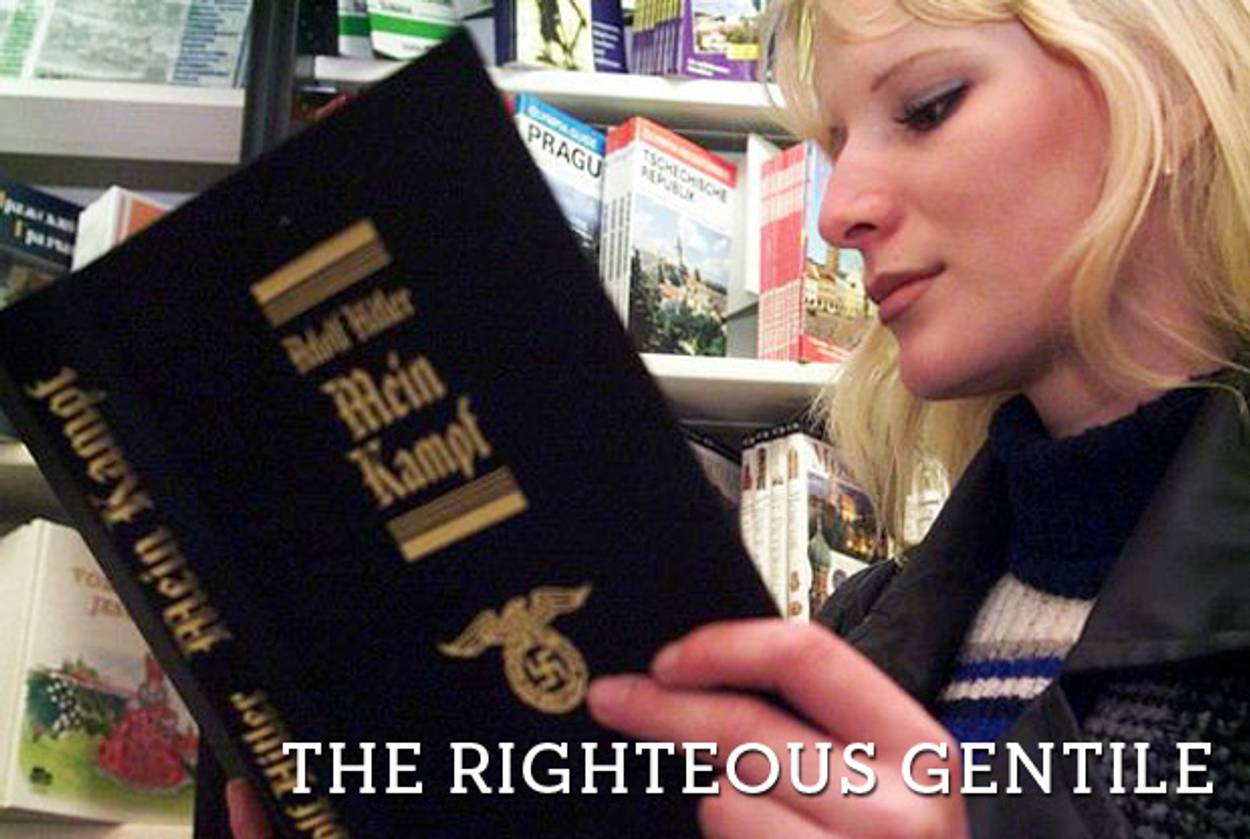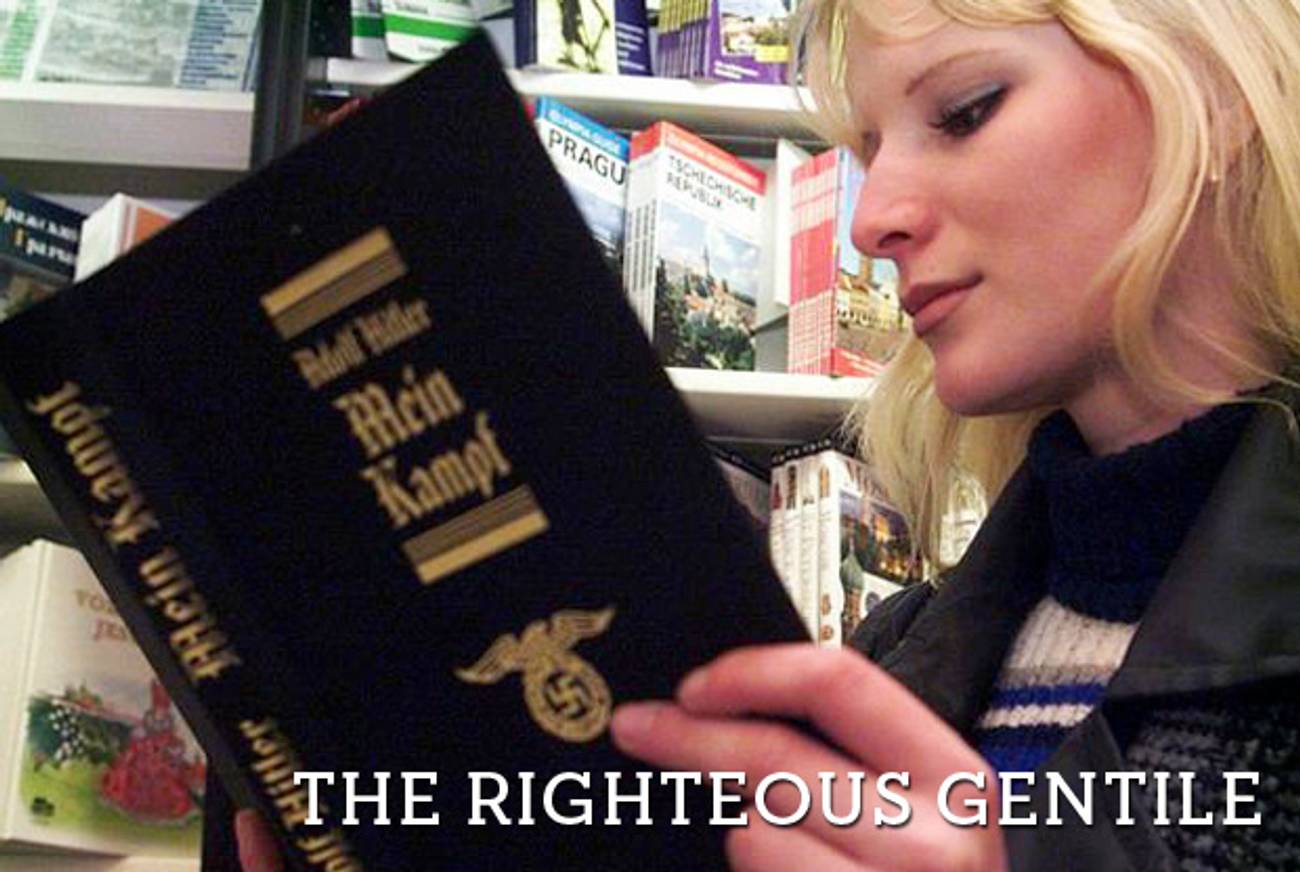What the Islamists Get Right
It’s time to admit that banning Mein Kampf while allowing anti-Islam cartoons is a double-standard




When a Western politician defends the freedom to mock religion—an increasingly rare species, particularly since the recent anti-Islam YouTube video—the offended Islamist can be relied upon to wring his hands (it’s never hers) and intone that there is a pernicious, perhaps Islamophobic, double standard at work. “If anyone doubts the Holocaust happened, they are imprisoned,” Mahmoud Ghozlan, a spokesman for Egypt’s Muslim Brotherhood, complained after the French satirical newspaper Charlie Hebdo published cartoons of Muhammad in September. There are different legal standards for offending the Muslim prophet, he said, and for questioning the historical truth of the Holocaust. “It is not fair or logical.”
After the Danish newspaper Jyllands-Posten published its now-notorious cartoons of the Prophet Muhammad in 2005, the Iranian government responded with a Holocaust cartoon contest and an “International Conference to Review the Global Vision of the Holocaust,” featuring a multiethnic assortment of lunatics and racists who denied that Nazi Germany pursued a policy of genocide against European Jews. A spokesman for the Iranian regime laid out the logic behind the contest: “They allow the Prophet to be insulted. But when we talk about the Holocaust, they consider it so holy that they punish people for questioning it.”
There are clear differences between denying a historical event like the Holocaust and mocking religious prophets, but the Islamists who see a free-speech double standard in Europe are correct. In Germany and Russia, for example, the printing and selling of Mein Kampf is banned (though Germany has recently considered publishing a version of the book annotated by historians). Holocaust deniers can be prosecuted in Austria, Belgium, Czech Republic, France, Germany, Hungary, Romanian, Poland, and Luxembourg. Other European states don’t explicitly outlaw denial but often prosecute offenders on other statutes, like inciting racial hatred. In all these countries, though, the mocking of religious belief—be it Islam or Christianity—is protected speech. And perhaps more important, these laws, while well-intentioned, have had little effect on the distribution or consumption of offensive material. By forbidding it, these governments may actually be creating interest where there was previously none.
Despite a lack of evidence that such laws are effective, some feel that given the horrors of recent European history, restricting offensive speech is justified and necessary. Speaking alongside novelist Salman Rushdie in 2010, Holocaust survivor Elie Wiesel defended the principles of free speech against those who demanded religious exemptions, with one significant exception: “Holocaust denial today—what it does to the children of survivors—I believe [it] should be illegal.” It wasn’t a very convincing case, and Rushdie quickly expressed his disagreement. But Wiesel’s case isn’t an uncommon one. The Jewish Board of Deputies in Great Britain strongly condemned British Home Secretary Michael Howard in 1996 for not supporting denial legislation, which the board claimed left Britain “isolated” in Europe.
It’s an uncomfortable sentence to write: The Islamists are right about this—with one crucial caveat. Radical Muslims want equality of legal sanction in exactly the wrong direction.
***
Iran’s Holocaust-denial conference and the press it generated underscore the danger inherent in criminalizing pernicious ideas, a temptation to which many European governments have eagerly submitted. For one, jailing pseudo-historians for arguing against historical fact creates martyrs: Why do we know the names of David Irving, Robert Faurisson, Bishop Richard Williamson, and Ernst Zundel and not those who have denied the Cambodian genocide, or those who claim that the Srebrenica massacre was fabricated or that the 9/11 attacks were an Israeli-sponsored “inside job”? (Such anti-Israel conspiracy theories are not illegal in Europe, despite being marinated in anti-Semitic paranoia about omnipotent Jewish power.) It’s partially because we know victims of the Holocaust and their relatives—those Wiesel understandably wants to protect from psychological injury. And it’s because of those postwar Germans who said nie wieder, insisting that their country grapple with its past by requiring the study of the Holocaust in school curricula.
But we also know their names because Irving, Faurisson, and Zundel have been hauled before courts in France, Germany, and Austria to face criminal charges. Earlier this year, Iranian President Mahmoud Ahmadinejad garlanded Faurisson with an award for his “courage, strength, and force” against the Jewish enemy. This is the result of failing to trust regular people to adjudicate historical truth; Europe has inadvertently elevated liars.
Legal restrictions have never been effective at preventing the spread of Holocaust denial, but technology has now enabled the almost unrestricted flow of information and makes no exceptions for quality or truth. Those who believe in the efficacy of Holocaust-denial laws, or Germany’s anachronistic ban on the sale of Mein Kampf, must also contend with the free flow of bad ideas on the Internet, where a copy of Hitler’s soporific prison manifesto can be obtained in multiple languages at no cost. If one wants to find discursive, footnoted, and thoroughly phony “investigations” into the missing gas chambers at Auschwitz, they are always only a few clicks away, despite the German government’s frequent requests to have such material pulled from Google’s search results. Of course, in Germany one can also easily find material from fringe academics defending the records of Joseph Stalin, Mao, Pol Pot, Milosevic, and Kim il Sung, though such material can be legally distributed in most bookstores.
If the goal of free-speech restrictions is to prevent the rise of right-wing extremism, such legal measures have been largely unsuccessful. In Austria, for instance, where David Irving was imprisoned for Holocaust denial, the populist Freedom Party—whose current leader recently posted a photo of a hook-nosed Jew wearing Star of David cufflinks on his Facebook page—has been hugely successful, with recent opinion polls showing their support at 21 percent. Compare that to the United States, where toxic polemics claiming to have uncovered a “Holohoax” are protected by the First Amendment, fascism is almost nonexistent as a political force, and levels of anti-Semitism are significantly lower than in European countries that criminalize Holocaust denial.
So, if Holocaust-denial laws are ineffectual, if they make martyrs of cranks, should they exist, as Elie Wiesel suggests, to protect the sensitivities of those offended by anti-Semitic pseudo-history? This is a mirror image of the argument made by pundits, politicians, and religious leaders following the clumsy anti-Islam YouTube video released last month. And it’s an argument that those who care about liberal values should resist.
***
Like this article? Sign up for our Daily Digest to get Tablet Magazine’s new content in your inbox each morning.
Michael Moynihan, Tablet Magazine’s “Righteous Gentile” columnist, is the cultural news editor of Newsweek/The Daily Beast.
Michael Moynihan, Tablet Magazine’s “Righteous Gentile” columnist, is the cultural news editor of Newsweek/The Daily Beast.